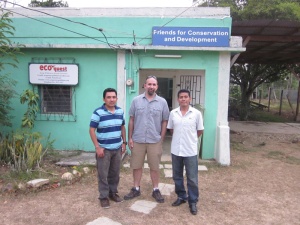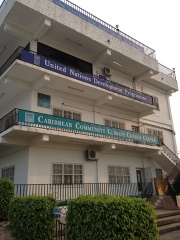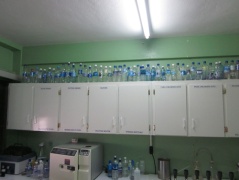Agriculture News
WKU team visits Belize to develop research collaborations, educational programs
- Thursday, June 20th, 2013
At the end of May, a group of faculty from WKU’s Department of Geography and Geology and Honors College, in association with the Office of International Programs, visited Belize for a marathon week of meetings with several entities within the country to initiate multiple projects that will provide student and faculty teaching, research and engagement opportunities, as well as develop collaborations and capacity building within the region in the areas of climate change, water resources, karst geoscience, environmental education and sustainability.

During a recent visit to Belize, Dr. Jason Polk (center) met with Rafael Manzanero (right), Director of Friends for Conservation and Development, and Derek Chan (left) about the Chiquibul National Park.
The visit included meetings with the Ministry of Health, Caribbean Community Climate Change Centre, the U.S. Embassy, the University of Belize, and Friends for Conservation and Development, among others.
The team included Dr. Bernie Strenecky, Scholar in Residence and Honors College faculty member; Dr. Jason Polk, Associate Director of Science for the Hoffman Environmental Research Institute and Assistant Professor of Geosciences; and Eileen Strenecky.
The team began its visit with the Ministry of Health and a tour of the National Water Quality Laboratory with Anthony Flowers, Water Analyst. His office is responsible for testing and informing policy on water quality for the entire country of Belize. WKU is collaborating with the Ministry of Health to find ways to enhance testing capabilities and provide training to increase the capacity for improving water resources in Belize. This will hopefully include student training opportunities, and faculty development and exchange programs.
The team met with partners from the Caribbean Community Climate Change Centre (CCCCC), which serves as the regional information clearing house and advisor for climate change policy and guidelines for the Caribbean Community Member States (CARICOM), to continue discussions related to climate change education, a regional downscale climate model, and developing collaborative programs in climate and water resource research in the Caribbean.
Dr. Strenecky also presented the CCCCC with an invitation to participate in WKU’s Toppers At Sea summer enrichment program in 2014, which will have a theme of Climate Change and provide students the opportunity to present their views on a global stage regarding future climate issues.
Dr. Polk and Dr. Leslie North of the Department of Geography and Geology, along with several colleagues from the University of Belize (UB) in Belmopan, which is the National University of Belize, are involved in collaborative grant proposals related to water resource issues in Belize and are pursuing new ways to provide students from WKU and UB to work together on these problems.

Among the stops for the WKU team was the headquarters for the Caribbean Community Climate Change Centre in Belmopan, Belize.
Toward the goals of collaboration and outreach synergy, the team met with representatives from the University of Belize, including the President, Dr. Cary Fraser, and the Dean of Science and Technology, to discuss additional opportunities to partner in developing faculty and student exchange programs, co-curriculum for climate and water resource management programs and synergistic research possibilities. These goals align well with WKU’s Honors College and Office of International Programs in being able to offer international student research and study abroad programs in Belize.
The week wrapped up in a meeting with Friends of Conservation and Development (FCD) in Belize, directed by Rafael Manzanero, and several of his staff, to discuss collaboration related to scientific study and conservation in Chiquibul National Park. Within this protected area exists both Caracol, one of the largest Maya cities of the past and a renowned archaeological site, and Chiquibul Cave, which extends over 55 km in length and contains the largest cave chamber in the Western Hemisphere. Collectively, this is one of the largest protected karst regions and tropical forests in Belize, and FCD is challenged with helping to manage and protect these fragile resources.
Following up on a previous visit earlier this year by Manzanero to the United States to meet with representatives from Mammoth Cave National Park, The Nature Conservancy and WKU, Dr. Polk is working to develop collaborative projects to assist FCD on several fronts related to cave and karst management, climate change and water resources, and ways by which students can engage in learning opportunities and applied research regarding these important issues in Belize.
Dr. Polk also visited Gales Point, Manatee, along the coast of Belize, where he is conducting research related to precipitation variability and climate change, to setup some monitoring equipment to measure hydrologic and climatic parameters. This will allow the study of how groundwater recharge is impacted during storms events in a highly vulnerable community of 500 that suffers from water quality and water access issues due to the fragile karst environment upon which it is located. Through these efforts, along with outreach and educational partnerships with the Ministry of Health and UB, the hope is to be able to use this as a model for better understanding the region’s future water resources and aid in planning for addressing potential climate change impacts.
Some of the links on this page may require additional software to view.


